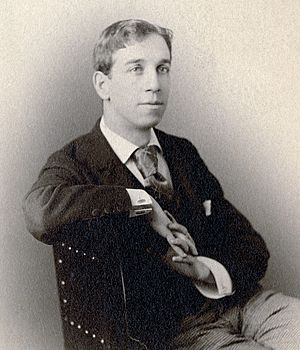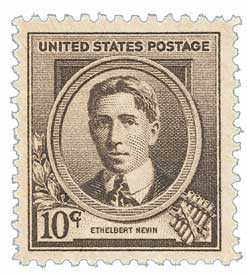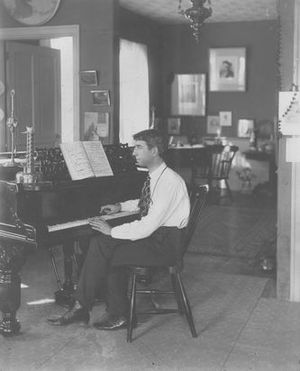Ethelbert Nevin facts for kids
Ethelbert Woodbridge Nevin (born November 25, 1862 – died February 17, 1901) was a talented American pianist and composer. He wrote many popular songs and piano pieces.
Contents
Early Life and Family
Ethelbert Nevin was born on November 25, 1862. His family lived at a place called Vineacre, right by the Ohio River in Edgeworth, Pennsylvania. He spent his first sixteen years there. Most of his schooling came from his father, Robert Peebles Nevin. His father was an editor for a Pittsburgh newspaper. He also wrote for many magazines. Robert Nevin even composed popular campaign songs.
Ethelbert's mother, Elizabeth Duncan Oliphant, was a skilled pianist. The very first grand piano ever brought across the Allegheny Mountains was for her! Music was important in the Nevin family. Ethelbert's younger brother, Arthur, also became a well-known composer. So did his cousins, George and Gordon Balch Nevin.
Learning Music
Ethelbert loved music from a very young age. He started playing the piano when he was only four years old. He needed cushions to reach the pedals! His father made sure he had lessons for both singing and instruments. Ethelbert also traveled abroad for two years. He studied music in Dresden with a teacher named Von Böhme.
In 1878, he attended Western University. This school is now known as the University of Pittsburgh. But he left after his first year in 1879. Later, he studied piano for two years in Boston. His teacher there was Benjamin Johnson Lang. He also learned about composing music from Stephen A. Emery.
Musical Journey
After studying in Boston for two years, Nevin moved back to Pittsburgh in 1882. He gave music lessons there. He saved enough money to travel to Berlin. He spent the years 1884, 1885, and 1886 in Berlin. There, he studied with a famous teacher named Karl Klindworth.
Nevin said about Klindworth: "I owe everything in my musical life to Herr Klindworth. He was a dedicated teacher. His patience was endless. He wanted to help students grow musically. But he also wanted to expand their minds in every way." Klindworth taught Nevin to appreciate great writers. These included Goethe, Schiller, and Shakespeare. He believed that being a musician meant understanding all arts and life.
In 1885, another famous musician, Hans von Bülow, chose four of Klindworth's best students. Nevin was one of these four honored students. They performed in special public concerts that year. These concerts featured music by Johannes Brahms, Franz Liszt, and Joachim Raff. Many important people attended these recitals. These included Frau Cosima Wagner and the violinist Joseph Joachim.
Nevin returned to America in 1887. He settled in Boston. He taught music and played in concerts sometimes.
In 1892, he went to Paris. There, he taught singing. He helped many American and French artists prepare for opera performances. In 1893, he moved to Berlin. He worked very hard on his compositions. This hard work made his health suffer. He then spent a year recovering in Algiers. In early 1895, he went on concert tours across America. Klindworth once said Nevin "has a touch that brings tears." This meant he was excellent at expressing feelings in his music.
Nevin looked for quiet places to compose. He lived in Florence for a while. There, he wrote his suite May in Tuscany (Op. 21). After a year in Venice, Nevin lived in Paris for a year. Then he returned to America. He stayed there until he passed away.
His most famous pieces are the piano song "Narcissus" from Water Scenes. His popular songs include "The Rosary" and "Mighty Lak' a Rose". The words for "Mighty Lak' a Rose" were written by Frank Lebby Stanton.
Personal Life and Legacy
Ethelbert Nevin was married to Anne Paul Nevin. They had two children together. The Nevin family's summer home, 'Arcady', is in Blue Hill, Maine. His family still owns it today.
Even though he was a famous composer, Nevin faced financial difficulties later in his life. These challenges caused him much stress. He sometimes worked too much, which made his health worse. On February 15, 1901, Nevin attended a concert in New Haven, Connecticut. After returning home, his health declined further. He felt numbness in his hands, which affected his ability to play the piano. On the morning of February 17, his health became very unpredictable. He passed away later that day in New Haven, Connecticut. He was only 38 years old.
Ethelbert Nevin was honored after his death. He was featured on a ten-cent U.S. postage stamp in 1940. This stamp was part of the "Famous Americans" series.
Piano Pieces
- Lilian Polka (1874)
- Op. 2 Sketchbook (1888)
- 1 Gavotte
- 3 Love Song
- 5 Berceuse
- 7 Serenata
- 9 Valse Rhapsodie
- Op. 6 Three Duets (1890)
- 1 Valse Caprice
- 2 Country Dance
- 3 Mazurka
- Op. 7 Four Compositions (1890)
- 1 Valser Gentile
- 2 Slumber Song
- 3 Intermezzo
- 4 Song of the Brook
- Op. 8 Melody and Habanera for Violin and Piano (1891)
- Op. 13 Water Scenes (1891)
- 1 Dragon Fly
- 2 Ophelia
- 3 Water Nymph
- 4 Narcissus
- 5 Barcarolle
- Op. 16 In Arcady (1892)
- 1 A Shepherd's Tale
- 2 Shepherds All and Maidens Fair
- 3 Lullabye
- 4 Tournament
- Op. 18 Two Études (1892)
- 1 In the Form of a Romance
- 2 In the Form of a Scherzo
- Barcarolle for Violin and Piano (1893)
- La Guitare (1896)
- Op. 21 May in Tuscany (1896)
- 1 Arlecchino
- 2 Notturno
- 3 Barchetta
- 4 Misericordia
- 5 Il Rusignuolo
- 6 La Pastorella
- Op. 25 A Day in Venice (1898)
- 1 Alba
- 2 Gondolieri
- 3 Canzone amorosa
- 4 Buona Notte
- Op. 30 En Passant (1899)
- 1 A Fontainebleau
- 2 In Dreamland
- 3 Napoli
- 4 At Home
- O'er Hill and Dale (1902)
- 1 'Twas a Lover and His Lass
- 2 The Thrush
- 3 Love Is A-Straying, Ever Since Maying
- 4 The Lark Is on the Wing
Songs
- Bed-Time Song (1887)
- Op. 2 Sketchbook (1888)
- 2 Im Wunderschönen Monat Mai
- 4 Du Bist Wie Eine Blume
- 6 Lehn Deine Wang' an Meine Wang'
- 8 Oh! That We Two Were Maying
- 10 In Winter I Get Up at Night,
Of Speckled Eggs the Birdie Sings,
Dark Brown Is the River
- Op. 3 Three Songs (1888)
- 1 Deep in a Rose's Glowing Heart
- 2 One Spring Morning
- 3 Doris
- Op. 5 Five Songs (1889)
- 1 Herbstgefuhl
- 2 La Chanson des Lavandieres
- 3 'Twas April
- 4 Raft Song
- 5 Before the Daybreak
- Op. 9 Wynken, Blynken, and Nod (1890)
- Op. 12 Songs for Soprano or Tenor (1891)
- 1 A Summer Day
- 2 Beat Upon Mine, Little Heart
- 3 In a Bower
- 4 Little Boy Blue
- 5 At Twilight
- Op. 17 Three Songs (1892)
- 1 Hab' ein Roslein
- 2 Le Vase Brise
- 3 Rappelle-toi
- Op. 20 A Book of Songs (1893)
- 1 A Fair Good Morn
- 2 Sleep, Little Tulip
- 3 Every Night
- 4 Airly Beacon
- 5 When the Land was White with Moonlight
- 6 A Song of Love
- 7 Nocturne
- 8 Dites-moi
- 9 Orsola's song
- 10 In der Nacht
- The Rosary (1898)
- Op. 28 Songs from Vineacre (issued separately)
- 1 A Necklace of Love (1899)
- 2 Sleeping and Dreaming (1899)
- 3 Mon dèsir (1899)
- 4 The Nightingale's Song (1899)
- 5 Dream-maker man (1900)
- 6 La lune blanche (1900)
- 7 Ein Heldenlied (1900)
- 8 Ein Liedchen (1900)
- An African Love Song (1901)
- Mighty Lak' a Rose (1901)
lyrics by Frank Lebby Stanton (1894)
Ethelbert Nevin Collection
The University of Pittsburgh has a special collection about Ethelbert Nevin. It includes his manuscripts, recordings, memorabilia, and original hand-written scores. These items help us learn about his life, his work, and his impact on music. The collection contains letters, music he was paid to write, and recordings of his work.
Honors and Recognition
During World War II, a Liberty Ship was named in his honor. It was called the SS Ethelbert Nevin.
 | Aaron Henry |
 | T. R. M. Howard |
 | Jesse Jackson |




